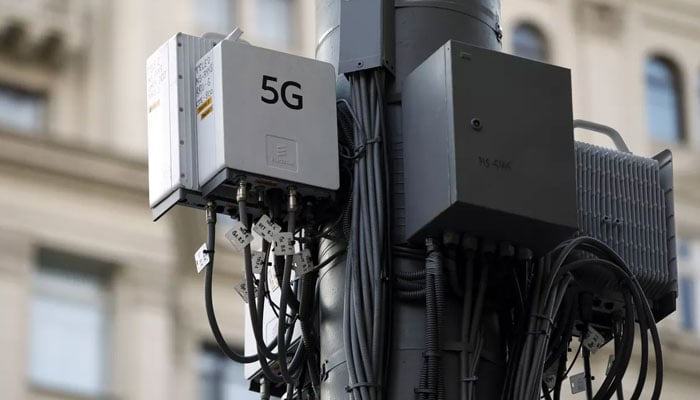WHO blasts 19 common myths related to coronavirus
LAHORE: Just a couple of days after the anti-5G technology protesters in Netherlands, which has recorded around 3,000 deaths till date due to the ongoing pandemic, had sabotaged phone towers in various cities including Rotterdam, the Geneva-based World Health Organization (WHO) has come out dispelling the myth on its official website that 5G mobile networks do not spread Covid-19.
The 5G is the fifth generation of wireless communications technologies supporting cellular data networks, and it is expected to be one of the fastest wireless technologies ever created, resulting in much quicker downloads etc.
Large-scale adoption of this wireless technology began in 2019 and today virtually every telecommunication service provider in the developed world is upgrading its infrastructure to offer 5G functionality, but people in various European countries, including Holland, have been expressing concerns over possible health risks and privacy violations since January this year, when around 100 people had rallied against the 5G network in Amsterdam, calling for its rejection on the basis of health and well-being.
And now, a vociferous section of the European public thinks 5G mobile networks are spreading Covid-19, forcing the World Health Organization to blast this myth.
Having a budget of over $4.2 billion, the United Nations-led WHO thus comes to the fore to categorically declare: "Viruses cannot travel on radio waves/mobile networks. Covid-19 is spreading in many countries that do not have 5G mobile networks. Covid-19 is spread through respiratory droplets when an infected person coughs, sneezes or speaks. People can also be infected by touching a contaminated surface and then their eyes, mouth or nose."
And there are many other unfounded facts and viewpoints that the WHO has endeavoured to address on its website.
Myth Number 2:
Exposing yourself to the sun or to temperatures higher than 25 degrees Centigrade does not prevent the coronavirus disease (Covid-19).
Founded in April 1948, this organization maintains: "You can catch Covid-19, no matter how sunny or hot the weather is. Countries with hot weather have reported cases of Covid-19. To protect yourself, make sure you clean your hands frequently and thoroughly and avoid touching your eyes, mouth, and nose."
Myth Number 3:
You can recover from the coronavirus disease. Catching the new coronavirus does not mean you will have it for life.
Operating with a broad mandate includes advocating for universal healthcare and monitoring public health risks, the WHO asserts: "Most of the people who catch Covid-19 can recover and eliminate the virus from their bodies. If you catch the disease, make sure you treat your symptoms. If you have cough, fever, and difficulty breathing, seek medical care early – but call your health facility by telephone first. Most patients recover thanks to supportive care."
Myth Number 4:
Drinking alcohol does not protect you against Covid-19 and can be dangerous.
The WHO proclaims: "Currently headed by a former Ethiopian health minister and foreign minister, this agency propounds: "Frequent or excessive alcohol consumption can increase your risk of health problems."
Myth Number 5:
Being able to hold your breath for 10 seconds or more without coughing or feeling discomfort does not mean you are free from the coronavirus disease or any other lung disease.
The premier United Nations agency responsible for international public health, pronounces: "The most common symptoms of Covid-19 are dry cough, tiredness and fever. Some people may develop more severe forms of the disease, such as pneumonia. The best way to confirm if you have the virus producing Covid-19 disease is with a laboratory test. You cannot confirm it with this breathing exercise, which can even be dangerous."
To be continued
-
 Kelly Clarkson Ready To Date After Talk Show Exit?
Kelly Clarkson Ready To Date After Talk Show Exit? -
 Is AI Heading Into Dangerous Territory? Experts Warn Of Alarming New Trends
Is AI Heading Into Dangerous Territory? Experts Warn Of Alarming New Trends -
 Google Updates Search Tools To Simplify Removal Of Non-consensual Explicit Images
Google Updates Search Tools To Simplify Removal Of Non-consensual Explicit Images -
 Chilling Details Emerge On Jeffrey Epstein’s Parties: Satanic Rights Were Held & People Died In Rough Intimacy
Chilling Details Emerge On Jeffrey Epstein’s Parties: Satanic Rights Were Held & People Died In Rough Intimacy -
 50 Cent Gets Standing Ovation From Eminem In New 'award Video'
50 Cent Gets Standing Ovation From Eminem In New 'award Video' -
 Bad Bunny Delivers Sharp Message To Authorities In Super Bowl Halftime Show
Bad Bunny Delivers Sharp Message To Authorities In Super Bowl Halftime Show -
 Prince William 'worst Nightmare' Becomes Reality
Prince William 'worst Nightmare' Becomes Reality -
 Thai School Shooting: Gunman Opened Fire At School In Southern Thailand Holding Teachers, Students Hostage
Thai School Shooting: Gunman Opened Fire At School In Southern Thailand Holding Teachers, Students Hostage -
 Britain's Chief Prosecutor Breaks Silence After King Charles Vows To Answer All Andrew Questions
Britain's Chief Prosecutor Breaks Silence After King Charles Vows To Answer All Andrew Questions -
 Maxwell Could Get 'shot In The Back Of The Head' If Released: US Congressman
Maxwell Could Get 'shot In The Back Of The Head' If Released: US Congressman -
 New EU Strategy Aims To Curb Threat Of Malicious Drones
New EU Strategy Aims To Curb Threat Of Malicious Drones -
 Halle Berry On How 3 Previous Marriages Shaped Van Hunt Romance
Halle Berry On How 3 Previous Marriages Shaped Van Hunt Romance -
 Facebook Rolls Out AI Animated Profile Pictures And New Creative Tools
Facebook Rolls Out AI Animated Profile Pictures And New Creative Tools -
 NHS Warning To Staff On ‘discouraging First Cousin Marriage’: Is It Medically Justified?
NHS Warning To Staff On ‘discouraging First Cousin Marriage’: Is It Medically Justified? -
 Andrew Mountbatten-Windsor Flew Money In Suitcases To Launder: New Allegation Drops
Andrew Mountbatten-Windsor Flew Money In Suitcases To Launder: New Allegation Drops -
 Nancy Guthrie Abduction: Piers Morgan Reacts To 'massive Breakthrough' In Baffling Case
Nancy Guthrie Abduction: Piers Morgan Reacts To 'massive Breakthrough' In Baffling Case




